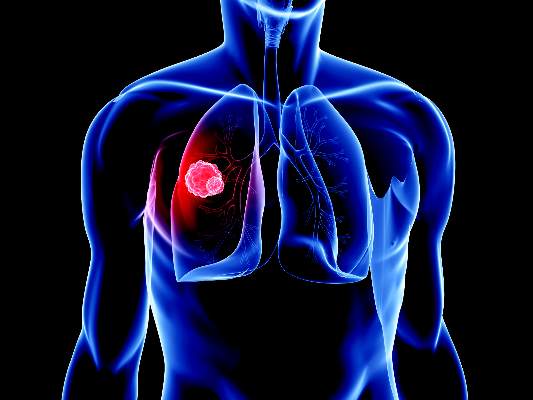User login
After induction chemotherapy and concurrent chemoradiotherapy, patients with non–small cell lung cancer (NSCLC) who underwent surgery versus dose-escalated chemoradiotherapy had similar 5-year overall survival rates.
With a median follow-up of 78 months, the 5-year overall survival for the surgery arm was 44% compared with 40% for the chemoradiotherapy arm, and progression-free survival (PFS) rates were 32% vs. 35%, respectively. In addition, the study showed no significant improvement for the surgery group in the median overall survival or median PFS.
Although the results did not demonstrate a benefit for surgery versus chemoradiotherapy, the 5-year overall survival data for all randomly assigned patients, “are among the best reported so far from prospective trials with definitive chemoradiotherapy,” wrote Dr. Wilfried Eberhardt, of the department of medical oncology, University Hospital Essen, Germany, and colleagues. “Both trimodality treatment that includes surgery and bimodality treatment without surgery but with a definitive chemoradiotherapy boost lead to excellent long-term [overall survival] and PFS,” the researchers wrote (J Clin Oncol 2015 Oct 26. doi:10.1200/JCO.2015.62.6812).
The multicenter phase III trial enrolled 246 patients with NSCLC stage IIIA-UICC6 (n = 75) or IIIB-UICC6 (n = 171) from 2004 to 2013. Overall, 161 patients completed induction therapy with three cycles of cisplatin and paclitaxel and concurrent chemoradiotherapy with 45 Gy, hyperfractionated-accelerated radiotherapy. Patients who had complete, partial, or minor responses after the third cycle were randomly assigned to surgery (n = 81) or chemoradiotherapy (n = 80).
Toxicities of grades 3 and 4 were similar for both arms, as well as for the patients not randomly assigned.
Dr. Eberhardt reported having financial relationships with Eli Lilly, Boehringer Ingelheim, Pfizer, Novartis, Roche, and many other pharmaceutical companies. Several of his coauthors reported ties to industry sources.
After induction chemotherapy and concurrent chemoradiotherapy, patients with non–small cell lung cancer (NSCLC) who underwent surgery versus dose-escalated chemoradiotherapy had similar 5-year overall survival rates.
With a median follow-up of 78 months, the 5-year overall survival for the surgery arm was 44% compared with 40% for the chemoradiotherapy arm, and progression-free survival (PFS) rates were 32% vs. 35%, respectively. In addition, the study showed no significant improvement for the surgery group in the median overall survival or median PFS.
Although the results did not demonstrate a benefit for surgery versus chemoradiotherapy, the 5-year overall survival data for all randomly assigned patients, “are among the best reported so far from prospective trials with definitive chemoradiotherapy,” wrote Dr. Wilfried Eberhardt, of the department of medical oncology, University Hospital Essen, Germany, and colleagues. “Both trimodality treatment that includes surgery and bimodality treatment without surgery but with a definitive chemoradiotherapy boost lead to excellent long-term [overall survival] and PFS,” the researchers wrote (J Clin Oncol 2015 Oct 26. doi:10.1200/JCO.2015.62.6812).
The multicenter phase III trial enrolled 246 patients with NSCLC stage IIIA-UICC6 (n = 75) or IIIB-UICC6 (n = 171) from 2004 to 2013. Overall, 161 patients completed induction therapy with three cycles of cisplatin and paclitaxel and concurrent chemoradiotherapy with 45 Gy, hyperfractionated-accelerated radiotherapy. Patients who had complete, partial, or minor responses after the third cycle were randomly assigned to surgery (n = 81) or chemoradiotherapy (n = 80).
Toxicities of grades 3 and 4 were similar for both arms, as well as for the patients not randomly assigned.
Dr. Eberhardt reported having financial relationships with Eli Lilly, Boehringer Ingelheim, Pfizer, Novartis, Roche, and many other pharmaceutical companies. Several of his coauthors reported ties to industry sources.
After induction chemotherapy and concurrent chemoradiotherapy, patients with non–small cell lung cancer (NSCLC) who underwent surgery versus dose-escalated chemoradiotherapy had similar 5-year overall survival rates.
With a median follow-up of 78 months, the 5-year overall survival for the surgery arm was 44% compared with 40% for the chemoradiotherapy arm, and progression-free survival (PFS) rates were 32% vs. 35%, respectively. In addition, the study showed no significant improvement for the surgery group in the median overall survival or median PFS.
Although the results did not demonstrate a benefit for surgery versus chemoradiotherapy, the 5-year overall survival data for all randomly assigned patients, “are among the best reported so far from prospective trials with definitive chemoradiotherapy,” wrote Dr. Wilfried Eberhardt, of the department of medical oncology, University Hospital Essen, Germany, and colleagues. “Both trimodality treatment that includes surgery and bimodality treatment without surgery but with a definitive chemoradiotherapy boost lead to excellent long-term [overall survival] and PFS,” the researchers wrote (J Clin Oncol 2015 Oct 26. doi:10.1200/JCO.2015.62.6812).
The multicenter phase III trial enrolled 246 patients with NSCLC stage IIIA-UICC6 (n = 75) or IIIB-UICC6 (n = 171) from 2004 to 2013. Overall, 161 patients completed induction therapy with three cycles of cisplatin and paclitaxel and concurrent chemoradiotherapy with 45 Gy, hyperfractionated-accelerated radiotherapy. Patients who had complete, partial, or minor responses after the third cycle were randomly assigned to surgery (n = 81) or chemoradiotherapy (n = 80).
Toxicities of grades 3 and 4 were similar for both arms, as well as for the patients not randomly assigned.
Dr. Eberhardt reported having financial relationships with Eli Lilly, Boehringer Ingelheim, Pfizer, Novartis, Roche, and many other pharmaceutical companies. Several of his coauthors reported ties to industry sources.
FROM JOURNAL OF CLINICAL ONCOLOGY
Key clinical point: After a complex induction protocol, patients with non–small cell lung cancer (NSCLC) who underwent surgery vs. dose-escalated chemoradiotherapy had similar 5-year overall survival rates.
Major finding: Five-year overall survival for the surgery arm was 44% compared with 40% for the chemoradiotherapy arm; progression-free survival rates were 32% vs. 35%, respectively.
Data source: The multicenter phase III ESPATUE trial enrolled 246 patients with NSCLC stage IIIA-UICC6 (n = 75) or IIIB-UICC6 (n = 171).
Disclosures: Dr. Eberhardt reported having financial relationships with Eli Lilly, Boehringer Ingelheim, Pfizer, and Roche, and many other pharmaceutical companies. Several of his coauthors reported ties to industry sources.

